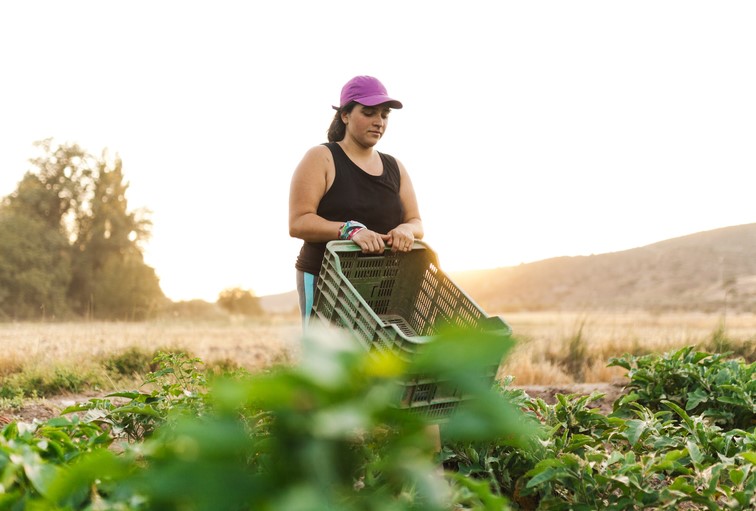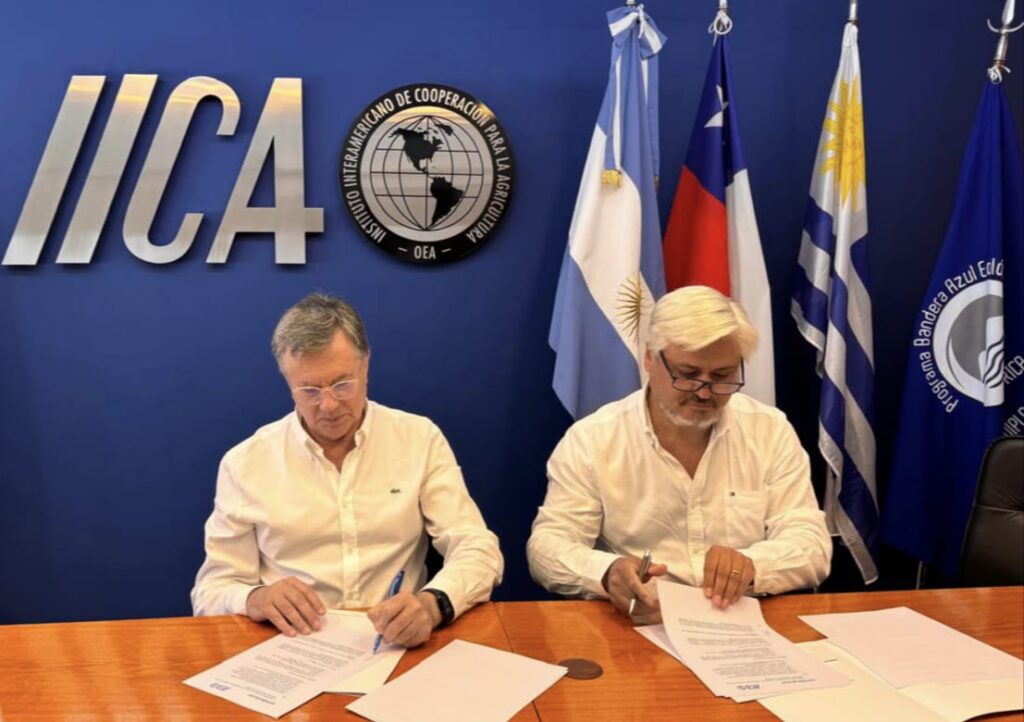Definen a la agricultura como una actividad fundamental para erradicar la pobreza, impulsar el desarrollo rural y proteger el medio ambiente y reclaman especial atención a las poblaciones rurales vulnerables y al Caribe y el Triángulo Norte Centroamericano. Además, destacan el papel de la agricultura y los productores agropecuarios como eslabón imprescindible y central de los sistemas alimentarios y la necesidad de robustecer los sistemas nacionales de ciencia y tecnología para aprovechar las nuevas oportunidades.

San José, 30 de junio de 2021 (IICA) – Los países de las Américas llegarán a la Cumbre de Sistemas Alimentarios de la ONU con una posición consensuada tras extensas jornadas de debates, en las que definieron principios y mensajes claves que defenderán de forma coordinada y conjunta en el foro global que buscará establecer compromisos y medidas para mejorar los sistemas alimentarios del mundo.
La Cumbre fue convocada por el Secretario General de la ONU, Antonio Guterres, con el objetivo de encaminar al planeta hacia el cumplimiento de los Objetivos de Desarrollo Sostenible (ODS), propuestas que buscan crear un marco de paz y prosperidad para la población global.
La unidad para la acción fue aprobada en la reciente sesión del Comité Ejecutivo del Instituto Interamericano de Cooperación para la Agricultura (IICA), de la que participaron 31 países, que refrendaron una resolución en la que afirmaron que los productores agrícolas tienen que estar debidamente representados en la Cumbre y su papel central para la alimentación también debe ser reconocido.
La posición unificada de los países de las Américas fue consolidada alrededor 16 mensajes claves y comenzará a plasmarse en Roma, donde en julio se realizará la Pre-Cumbre del foro global. Esos principios están incluidos en el documento “Principales mensajes en camino hacia la Cumbre de la ONU sobre Sistemas Alimentarios, desde la perspectiva de la agricultura de las Américas” , que los países hicieron propio a partir de un trabajo coordinado por el IICA.
El documento contiene 16 mensajes clave sobre el papel irremplazable de la agricultura. Esos mensajes resaltan que los productores agropecuarios y los trabajadores de los sistemas alimentarios son un eslabón imprescindible y central, y que sin producción agropecuaria no hay materias primas para transformar en alimentos.
Los mensajes, además, destacan a la agricultura como una actividad fundamental para erradicar la pobreza, impulsar el desarrollo rural y proteger el medio ambiente.
La Pre-Cumbre sobre Sistemas Alimentarios se realizará entre el 26 y el 28 de julio en Roma con la participación del IICA, que integra la Red de Campeones de Cumbres -una de las estructuras organizativas del foro- a la que se sumó en calidad de representante de los sectores agrícola y rural de América del Norte y América Latina y el Caribe.
El IICA propuso establecer como principios generales que los productores agropecuarios deben estar debidamente representados; que las decisiones y las políticas que se adopten deben estar basadas en ciencia; y que la agricultura es parte de la solución de los principales desafíos que enfrenta la humanidad.
A partir de ellos se redactaron mensajes clave que fueron modificándose de acuerdo a contribuciones recibidas durante un exhaustivo proceso de discusión, y fueron agrupados en cuatro categorías: transformación de los sistemas agroalimentarios; demanda de los consumidores y aspectos nutricionales; estrategias de producción y asuntos ambientales y el rol de las Américas.
Estos son los 16 mensajes clave que los países de las Américas llevarán a la Cumbre sobre Sistemas Alimentarios
Sobre la transformación de los sistemas agroalimentarios
Mensaje 1. A lo largo de las últimas décadas, los sistemas alimentarios mundiales han enfrentado mayormente con éxito la creciente demanda de alimentos, resultante del incremento poblacional y el aumento del ingreso per cápita. Sus futuras transformaciones, por lo tanto, deben partir de sus demostradas fortalezas y de las contribuciones ya realizadas.
Mensaje 2. Los productores agropecuarios y los trabajadores de los sistemas alimentarios son un eslabón imprescindible y central. Sin producción agropecuaria, no hay materias primas que se transformen en alimentos y, por lo tanto, se pone en serios riesgos la seguridad alimentaria. Además, la agricultura es central para la erradicación de la pobreza, el desarrollo rural y brinda servicios ecosistémicos claves para el logro de sistemas alimentarios sostenibles.
Mensaje 3. La transformación de los sistemas alimentarios globales debe ser equilibrada en relación con los siguientes atributos: capacidad de aumentar la producción y variedad de alimentos; sanidad e inocuidad; diversidad y calidad nutricional; y sostenibilidad ambiental, económica y social. Se reconoce que no existe un modelo único y los equilibrios y trade-offs serán distintos en cada país y subregión, por lo que importa que las transformaciones se lleven a cabo gradualmente según las responsabilidades, realidades y las particularidades de cada uno, garantizando que no quede nadie atrás.
Mensaje 4. El comercio internacional abierto, transparente y previsible es central para un sistema alimentario global eficiente y debe regirse por la normativa multilateral, con el fin de promover la liberalización agrícola y reducir las restricciones arancelarias y no arancelarias. Es fundamental que el sistema multilateral desempeñe un rol cada vez más activo para limitar y reducir la distorsión del comercio y la producción y velar por la adopción y aplicación de medidas sanitarias y fitosanitarias basadas en ciencia.
Sobre la demanda de los consumidores y aspectos nutricionales
Mensaje 5. Las decisiones sobre qué consumir deben dejarse al consumidor que toma sus decisiones basado en factores históricos, culturales, de acceso y de disponibilidad, entre otros, que debe ser respetado. El Estado debe educar e informar sobre dietas saludables, así como desarrollar campañas de prevención en resguardo de la salud pública, fundamentadas en información actualizada y evidencia científica.
Mensaje 6. Proteínas de alta calidad, carbohidratos (cereales y azúcares), grasas y alimentos fortificados y biofortificados para alcanzar una dieta equilibrada y nutritiva que contribuya a la salud humana.
Mensaje 7. El deseable y necesario aumento del consumo de frutas, legumbres y hortalizas solo será posible mediante un notable esfuerzo en la producción y educación de la población para el consumo de dichos productos y en la logística para su comercialización, el cual los hará más competitivos y accesibles, especialmente en favor de los consumidores de menores ingresos.
Mensaje 8. Implementar sistemas de producción sostenibles dentro de esquemas de “una sola salud” u otros que agreguen beneficios de salud pública a lo largo de toda la cadena de valor es una estrategia útil para desarrollar sistemas agroalimentarios que optimicen los resultados sanitarios reconociendo la interconexión entre las personas, los animales, las plantas y el entorno que comparten.
Sobre las estrategias de producción y asuntos ambientales
Mensaje 9. Los nuevos escenarios de la ciencia y la tecnología representan una oportunidad estratégica para avanzar hacia una agricultura más productiva y sostenible, gracias a que posibilitan mayores niveles de precisión y eficiencia. La economía circular y la bioeconomía, que implican un enfoque en el uso eficiente de los recursos (incluida la intensificación sostenible de la producción) y la reducción y reutilización de los desperdicios de la producción agropecuaria para la producción de otros bienes, y la inversión en investigación y desarrollo (I+D) son elementos claves en este nuevo escenario.
Mensaje 10. Los sistemas de producción de alimentos son particularmente vulnerables a los efectos adversos del cambio climático. Los desafíos que impone el cambio climático hacen imprescindible centrar los esfuerzos en la adaptación, a fin de garantizar la resiliencia del sistema y mantener la producción necesaria para la seguridad alimentaria. La producción agropecuaria debe avanzar hacia sistemas sostenibles que propicien un balance entre la emisión de carbono y su captura y que consideren las externalidades positivas resultantes de los servicios ecosistémicos, para lo cual se requieren sistemas que los cuantifiquen y que propicien su capitalización. Las nuevas tecnologías contribuyen a la armonización de la producción agropecuaria con la salud del ambiente y los ecosistemas, aspecto indispensable para su resiliencia.
Mensaje 11. Lograr un sistema alimentario más equilibrado y eficiente requerirá un plan de inversiones para el desarrollo de tecnología e infraestructura de producción, transporte y logística de gran magnitud. Para que estas inversiones se hagan efectivas, es necesario que los países diseñen y ejecuten planes estratégicos de mediano plazo que permitan desarrollar alianzas público-privadas. Los Estados deben invertir en infraestructura básica y bienes públicos, sobre los cuales luego los actores privados puedan destinar sus inversiones. Estos esfuerzos exigirán un importante apoyo de la cooperación y el financiamiento internacionales.
Sobre el rol de las Américas
Mensaje 12. Las Américas contribuyen a la seguridad alimentaria y nutricional global, al ser la principal región exportadora de alimentos y la mayor proveedora de servicios ecosistémicos y reserva de biodiversidad. Además, desempeña un rol fundamental en la sostenibilidad ambiental y en la mitigación de los efectos del cambio climático a escala mundial.
Mensaje 13. Para que la agricultura contribuya a lograr los equilibrios globales, se requerirán políticas de inclusión productiva y protección social orientadas a asegurar la sustentabilidad social y económica, y a atender las carencias que enfrentan los sectores más vulnerables en los territorios rurales. Estas políticas deberán ser transversales al conjunto de los productores y prestar especial atención a las necesidades de la agricultura familiar, la juventud, las mujeres rurales y los pobres rurales e indígenas.
Mensaje 14. Los productores agropecuarios están en el centro de los sistemas agroalimentarios de las Américas, con una gran diversidad de sistemas y planteamientos productivos, incluyendo la agricultura familiar. Es esencial, por lo tanto, que participen en el debate y el diseño de las estrategias diferenciadas a implementar.
Mensaje 15. El Caribe requiere una mirada particular, al ser una subregión dependiente de las importaciones de alimentos, afectada frecuentemente por desastres naturales y el cambio climático e integrada por Estados insulares de menor escala y competitividad agrícola. Fortalecer la resiliencia frente a los eventos climáticos, reducir los niveles de inseguridad alimentaria y aplicar enfoques de cooperación internacional y financiamiento para hacer frente a los nuevos modelos son prioridades por considerar especialmente en el Caribe Oriental y Haití.
Mensaje 16. La situación de inseguridad alimentaria con implicaciones sociales, económicas y ambientales que afectan al Triángulo Norte Centroamericano merece una atención especial.
Más información:
Gerencia de Comunicación Institucional
comunicacion.institucional@iica.int










